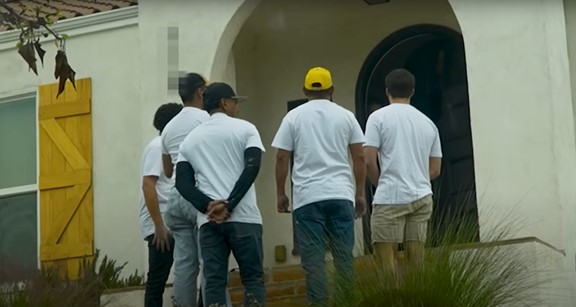In recent news, supporters of Kamala Harris have found themselves in a perplexing situation after receiving letters and postcards suggesting they would be “volunteering” to house migrant families. Comedian Seth Meiring, originally from Delta, Ohio, took to social media to capture the live reactions of these supporters when confronted with the potential need to host border crossers. His video garnered attention for its humorous portrayal of Harris’s backers, particularly as they grappled with the implications of their political support. Meiring sets out to document a social experiment aimed at testing the commitment of Harris’s supporters in light of their purported support for migrant families amid the crisis at the U.S.-Mexico border.
Meiring’s comedic journey begins with his own skepticism about the unwavering loyalty of Kamala Harris’s supporters. He records a segment in which he jokingly tells his father his plan to feign liberal beliefs, raising his father’s dismay. To further probe the political belief systems of Harris supporters, Meiring decides to conduct interviews with individuals he encounters at a political rally. Through conversations with these participants, he notes their seemingly blind loyalty to Harris, prompting him to dig deeper into their stances by exposing them to contrived news segments to elicit spontaneous and genuine reactions. One such segment involves a spoof announcement declaring Harris’s ascension to the presidency following Trump’s withdrawal from the race, where she introduces controversial policies—most shockingly, enforcing mandatory labor camps for seniors—which resonates alarmingly with his grandmother before she realizes it’s a joke.
Motivated by curiosity, Meiring embarks on a mission to test the principles of Harris’s supporters regarding immigration policy. He aims to challenge their professed values surrounding the treatment of undocumented immigrants, an area where Harris, as the border czar, has faced scrutiny. Meiring’s initial interactions paint a picture of supporters who emphasize the need to extend assistance to immigrants, seemingly regardless of the implications. This inspires him and a friend to travel to California, where they concoct a plan to impersonate Harris staffers and deliver “illegal immigrants” to the homes of her supporters, further engaging with the contradictions within the liberal ideology surrounding immigration.
Arriving in a well-off neighborhood where residents have largely expressed support for Harris, Meiring and his friend knock on doors to reveal their “surprise”—Hispanic individuals posing as recent arrivals needing shelter. Despite their professed support for immigrant rights, every resident they encounter recoils at the notion of actually housing these individuals, citing various reasons for their refusals. Their euphemistic excuses range from concerns about personal space and health issues to objections based on property agreements, showcasing a stark divergence between their political support and willingness to put those beliefs into practice.
In one notable exchange, even attempts to compromise by suggesting that the “immigrants” could sleep in tents outside were met with hostility. The reactions from the residents highlight the superficiality of their compassion; they reacted more strongly to Meiring’s pronunciation of Harris’s name than to the prospect of supporting actual human beings in need. This contradiction between advocacy and personal action raises pertinent questions about the authenticity of their political beliefs, particularly when faced with the discomfort that such beliefs entail in real-world scenarios.
In conclusion, Meiring’s social experiment serves as a humorous yet pointed commentary on political hypocrisy. As the video wraps up with Meiring returning to Ohio and sharing his experiences with his father, he culminates his narrative in a moment of incredulity regarding the dissonance displayed by Harris’s supporters. Their reactions reflect an unwillingness to confront the tangible implications of the policies they endorse, leading Meiring to label them as “nuts.” This exploration of liberal attitudes towards immigration challenges viewers to critically evaluate the intersection of their political beliefs and personal actions. The piece underscores the broader societal issues of responsibility and empathy in political discourse amid a polarized environment, ultimately leaving the audience to ponder whether a change in leadership—possibly a return of Trump—may offer a path toward addressing these complex challenges.

